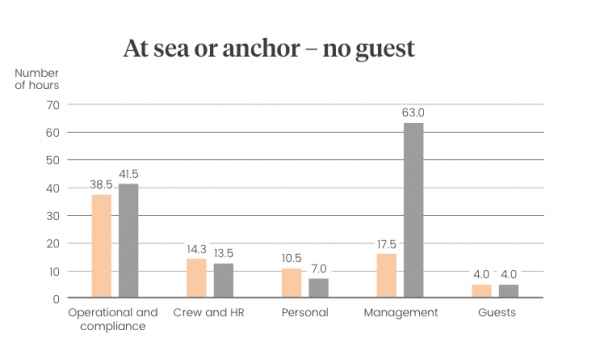MLC hours of work and rest: the real numbers
After receiving a superyacht captain's hours-of-work-and-rest logbook, we take a look at the figures and what's really achievable.…
Google ‘MLC hours of work and rest’ and in 1.08 seconds a mere 799,000 results show up. Add the word ‘superyacht’ to your search and you’re left with 22,400. And since the Maritime Labour Convention’s (MLC) ratification in 2011, 14 individual news stories pertaining to this single regulation (which, including the associated guidelines of adoption, take up just over two pages of a 100+ page document), appear on SuperyachtNews. That’s more than two stories a year on this particular part of the MLC, which hasn’t been the subject of any amendments.
In short, nothing’s changed since the Convention’s ratification and its associated hours of work and rest (that dictate crew working on vessels flying a flag, or in the waters of a flag, that has ratified the convention, should: not exceed 14 hours of in any 24-day period or 72 hours in any seven-day period; or should not fall below 10 hours of rest per 24-day period and 77 hours in a seven-day period), but it’s a topic that’s quite clearly taken the superyacht industry by storm.
That’s why when we received a genuine hours-of-work-and-rest logbook from a current superyacht captain that proved it was near impossible, on the superyacht in question, to adhere to these requirements, we knew we needed to do something with it.
One of the most notable conflicts is time spend on management. The captain allocated an optimal 17.5 hours to ‘management’ in a weekly period alongside, with no guests, but the actual figure is a staggering 63 hours – an increase of 260 per cent.
So in issue 182 of The Superyacht Report, Rachel Rowney delves into the intricacies of this logbook, which the captain sent to The Superyacht Report in a bid to raise awareness, and in which the captain details optimal weekly hours and actual hours. The allocated hours are split between five categories: operation and compliance, crew and HR, personal (short rest breaks or meals), management and guests). While this captain’s case study shows a plethora of discrepancies whereby the actual hours of work go far beyond the optimal, one of the most notable conflicts is time spend on management. The captain allocated an optimal 17.5 hours to ‘management’ in a weekly period alongside, with no guests, but the actual figure is a staggering 63 hours – an increase of 260 per cent.
This single example serves as a strong one of how important an issue hours of work and rest really is; the implications of and questions surrounding the amount of a captain’s time taken up on management, as detailed above, being just one of many.
The full article can be found in issue 182 of The Superyacht Report. Subscribe to Issue 182, our FLIBS and 24th Anniversary issue, of The Superyacht Report here.
Captains, yacht managers and owners’ representatives, among others, are eligible for a 12-month complimentary VIP subscription to The Superyacht Report and The Crew Report. To find out if you are eligible, please click here.
NEW: Sign up for SuperyachtNewsweek!
Get the latest weekly news, in-depth reports, intelligence, and strategic insights, delivered directly from The Superyacht Group's editors and market analysts.
Stay at the forefront of the superyacht industry with SuperyachtNewsweek
Click here to become part of The Superyacht Group community, and join us in our mission to make this industry accessible to all, and prosperous for the long-term. We are offering access to the superyacht industry’s most comprehensive and longstanding archive of business-critical information, as well as a comprehensive, real-time superyacht fleet database, for just £10 per month, because we are One Industry with One Mission. Sign up here.
NEW: Sign up for
SuperyachtNewsweek!
Get the latest weekly news, in-depth reports, intelligence, and strategic insights, delivered directly from The Superyacht Group's editors and market analysts.
Stay at the forefront of the superyacht industry with SuperyachtNewsweek




